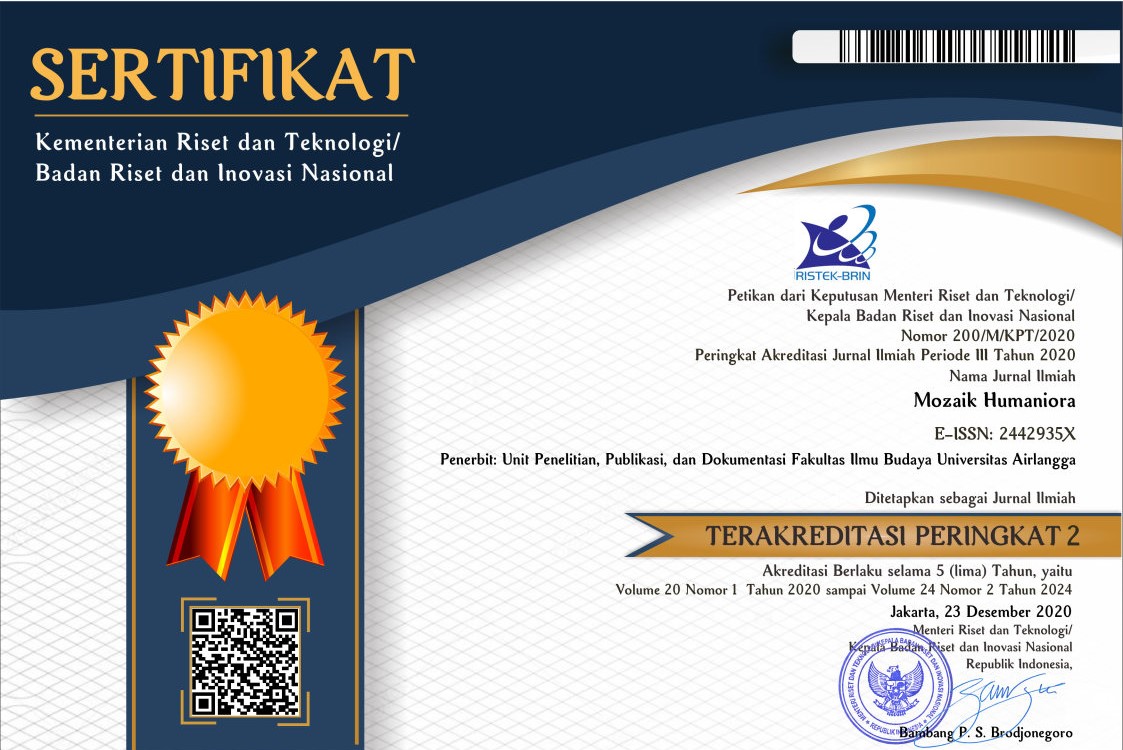Modal Britania di Indonesia Masa Kolonial
Downloads
Abstrak
Peranan Britania dalam ekonomi kolonial di Indonesia, utamanya pada abad kesembilan belas, masih jarang dikaji. Tulisan ini diawali dengan melihat peran penting yang dimainkan oleh para saudagar Britania dan rumah-rumah dagang Britania dalam periode ketika pemerintah kolonial meningkatkan cengkeramannya dalam ekonomi kolonial sejak tahun 1820-an. Kebijakan utama yang mencerminkan hal ini adalah cultuurstelsel atau kebijakan pengaturan pertanian sekaligus monopoli perdagangan melalui Nederlandsche Handel Maatschappij (NHM). Penelitian ini melacak bagaimana para saudagar dan rumah-rumah dagang Britania mengarungi persaingan usaha di tengah meningkatnya tekanan kepada mereka bahkan hingga masa pascakolonial. Dengan melihat perkembangan modal Britania serta peranan pedagang dan pengusaha Britania di Hindia sejak awal abad kesembilan belas hingga masa kemerdekaan, dapat ditunjukkan pentingnya modal dan pemain ekonomi yang tidak secara langsung terkait dengan negara. Berdasarkan gambaran sepintas mengenai pengusaha dan modal Britania di Hindia bisa ditunjukkan adanya peranan "swasta” dalam transformasi ekonomi kolonial. Pengusaha dan modal Britania masuk ke dalam sektor-sektor di mana negara belum siap masuk.
Kata kunci: ekonomi kolonial, Jawa, modal, saudagar Britania
Abstract
The British role in the colonial economy in Indonesia, especially in the nineteenth century, is seldom highlighted. This study focuses on looking at the important role played by the British merchants and merchant houses in 1820s. In the beginning of this period, the Dutch colonial state increased its tight grip on the colonial economy through a series of policies”most notably the cultuurstelsel or the cultivation system as well as the trading monopoly through the Nederlands Handels Maatschappij (NHM). Furthermore, the present study traces the ways in which the British merchants and merchant houses navigated their ways; on the contrary, they did not increase their pressure in the post-colonial era. By examining the development of British capital and the role of British merchants in the colonial period of Indonesia since the beginning of the nineteenth century until post-colonial era, it is shown that capital and merchants had significant roles. Based on the findings on British capital and merchants in colonial era, private sector played a role in colonial ecomomy transformastion. Thus, British capital and merchants penetrated to sectors that was ovelooked by government.
Keywords: British merchants, capital, colonial economy, Java

Mozaik Humaniora is licensed under a Creative Commons Attribution-ShareAlike 4.0 International License. Both authors and Mozaik Humaniora agree with the following attribution of journal:
1. Copyright of this journal is possession of Author, by the knowledge of the Editorial Board and Journal Manager, while the moral right of the publication belongs to the author.
2. The journal allows the author(s) to retain publishing rights without restrictions
3. The legal formal aspect of journal publication accessibility refers to Creative Commons Attribution Share-Alike (CC BY-SA).
4. The Creative Commons Attribution Share-Alike (CC BY-SA) license allows re-distribution and re-use of a licensed work on the conditions that the creator is appropriately credited and that any derivative work is made available under "the same, similar or a compatible license”. Other than the conditions mentioned above, the editorial board is not responsible for copyright violation.


















